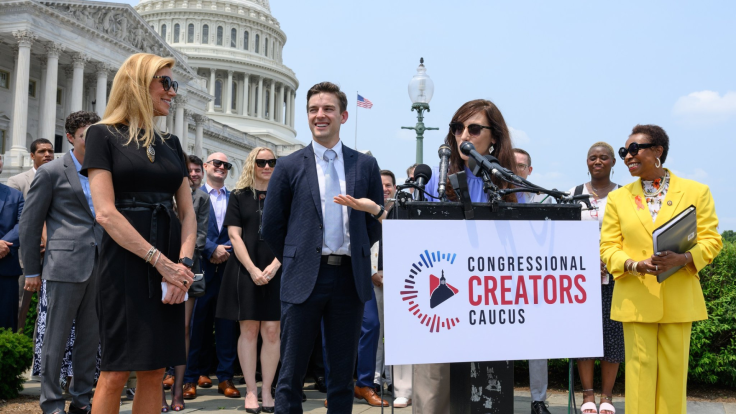Top US Content Creators Form Bipartisan Caucus: Here's Why They Advocate Privacy To AI Regulation

In a bid to accelerate support for greater support for content creators in the United States, prominent online personalities have joined forces with several members of the US Congress to form a new caucus advocating for the creator economy.
The bipartisan effort, aptly called 'Congressional Creators Caucus, ' aims to have creators work alongside Congress members on formulating laws and regulations related to some of the most pressing issues on the Internet–from AI regulation to online addiction.
Who Are The Creators Involved?
Leading the creators list are Matthew Patrick (MatPat) and Stephanie Patrick. The duo, who are married, are the founders of the Theorist YouTube channels, which include the popular Game Theory channel and spin-offs such as Food Theory, Film Theory, and Style Theory.
Speaking at a press event launching the caucus, MatPat said, 'It's our hope, through this Creator Caucus and through the conversations that it's going to inspire, that we can help educate legislators on these fast-moving, ever-evolving issues so that legislation is timely and relevant.'
He also highlighted the importance of the creator economy for small businesses and civilians, stating that it is an 'everyone' industry.
'More and more, all companies are relying on these digital platforms to get their messages out and to grow their customer bases or to improve their growth potential,' he added.
Aside from MatPat and Stephanie, other creators involved include popular Twitch streamer Pokimane and Kati Morton, as well as popular digital media company Jubilee, known for its discussions covering both sides of the political spectrum.
The Congress Members Involved in the Caucus
Representatives Yvette D. Clarke (Democrat-New York) and Beth Van Duyne (Republican-Texas) head the Congressional Creator Caucus, which has expressed interest in bringing the perspectives of online content creators into the public policy arena.
For Rep. Van Duyne, the caucus seeks to empower more Americans to follow their dreams, build their small businesses, and share their unique perspectives with the world.
'The Creators Caucus hopes to understand better how these developing small businesses are operating, their struggles, and how Congress can work with them to foster growth, opportunity, safety, and security for our digital creators and their viewers alike,' she said.
Meanwhile, Rep. Clarke highlighted that with digital content creators' online presence continuing to reach billions globally, Congress must work to ensure resources and protections are in place to support their success in this new era of start-ups.
'Congress has a responsibility to meet this moment. I am proud to establish this caucus as a first-of-its-kind bipartisan forum for content creators and Congress to work together to address the challenges they face as nontraditional small business owners. Creators' voices deserve to be heard throughout the policy-making process, and the Creators Caucus is the key to ensuring they are,' she said.
Why This Matters
In a post, the popular monetisation platform Patreon stressed the importance of the caucus, noting that the creator economy is a legitimate profession made up of educators, artists, and entrepreneurs who build loyal communities but lack basic business protections.
'We need to see more from governing bodies and policymakers to legitimise the creator economy and bring it into the fold of small business support. Because what creators deserve is something more foundational: stability. Recognition. The ability and freedom to build a future without constantly bracing for volatility,' they stated.
It is worth noting that the creator economy is seeing a boom in the US, with Goldman Sachs forecasting that the industry could reach a half-trillion-dollar valuation by 2027.
The Creator Economy Caucus addresses urgent internet issues like AI, privacy, and online addiction to protect users and digital entrepreneurs. With AI rapidly reshaping content creation and consumption, creators face challenges of ownership, transparency, and fairness.
At the same time, growing concerns about data privacy and the mental health impact of addictive online platforms demand policy action. The caucus aims to ensure the Internet remains a safe, ethical, and sustainable space for all.
© Copyright IBTimes 2025. All rights reserved.





















